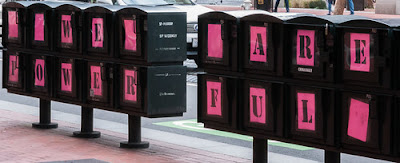International Wo(men)'s Day-Reflections
It's International Women's Day today. This day has been celebrated for more than a century. From bbc.com,
International Women's Day, also known as IWD for short, grew out of the labour movement to become a recognised annual event by the United Nations (UN).
The seeds of it were planted in 1908, when 15,000 women marched through New York City demanding shorter working hours, better pay and the right to vote. A year later, the Socialist Party of America declared the first National Woman's Day.
The idea to make the day international came from a woman called Clara Zetkin, communist activist and advocate for women's rights. She suggested the idea in 1910 at an International Conference of Working Women in Copenhagen. There were 100 women there, from 17 countries, and they agreed on her suggestion unanimously.
It was first celebrated in 1911, in Austria, Denmark, Germany and Switzerland. The centenary was celebrated in 2011, so this year we're technically celebrating the 111th International Women's Day.
Things were made official in 1975 when the United Nations started celebrating the day. The first theme adopted by the UN (in 1996) was "Celebrating the Past, Planning for the Future".
International Women's Day has become a date to celebrate how far women have come in society, in politics and in economics, while the political roots of the day mean strikes and protests are organised to raise awareness of continued inequality.
The official theme for this year's Women's Day is ‘DigitALL: Innovation and technology for gender equality.’ This year's day of observance will illuminate the fact that women disproportionately experience the impact of a digital gender gap on widening economic and social inequalities, and that's a very important issue to address, but that's not what I want to talk about here.
I want to honor the fact that despite the inequities that women have unfairly had to deal with through the ages, they have consistently risen to the occasion when it matters on behalf of all of us, and they've often done it with little to no support from men. For example, out of necessity, women have been the nurturing caregivers that children need, but also have been forced to assume the masculine role that children are often missing as a result of absent male role models in their lives. Women have proven over and over again that they are highly capable of assuming a masculine perspective when that's the one required. They know how to balance this reality.
I have witnessed and benefitted from this balance firsthand. My family represents a long history of intergenerational trauma and multiple risk factors surrounding my siblings and me. My interest in and experience with resilience began in the early years of my life because of the women that protected me and kept me moving toward a hopeful future. I have often said that the most powerful male role models in my life were all women, and I'm serious about that. The brave and loving women in my life took care of me in the most caring and nurturing ways, and they also kicked my ass when I needed it... they boldly and necessarily fulfilled their maternal responsibility, while also stepping up to project a masculine, paternal role when that's what they knew I needed. This is just what women do for kids, and they do it in all aspects of their lives, despite often being persecuted for it.
I recently came across this Voices of Youth blog about masculinity vs. feminity. Written by a young female, it's a remarkably insightful exploration into the idea that masculinity and feminity when viewed traditionally reflect manifestations of social constructs more than they do character traits. Whether man or woman, we all have character qualities that balance our souls. The blog suggests that a balance between traditionally perceived traits of masculinity and feminity is present in all human beings no matter the gender. On this, I fully agree.
I'm aware that this young girl and I present a perspective that many find very controversial. People seem to like the notion that men and women are necessarily identifiable by a neat and tidy set of conventional character traits that define them according to their gender, and I've never understood why this manifests as such a rigid and polarizing issue. True equality for women will emerge when society releases its obsession with defining gender by character traits and recognizes that women have been paving the way for this realization for centuries. As the blog author describes, traditionally applied gender-specific traits are broadly understood and accepted in society:
Traits that are considered masculine:- Dominant
- Strong
- Independent
- Assertive
- Brave
- Innovative
- Emotional
- Collaborative
- Nurturing
- Vulnerable
- Caring
- Humble



Great post thanks for the compliment!
ReplyDelete